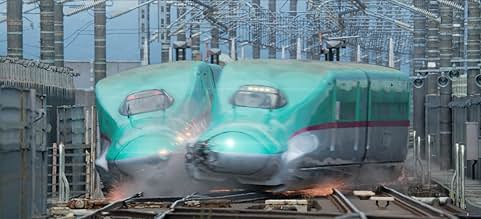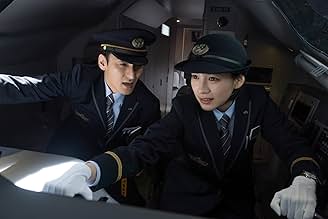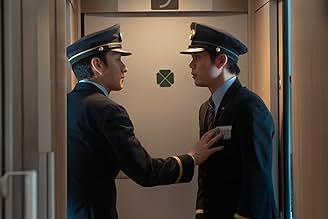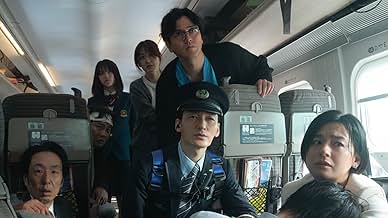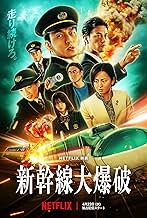CALIFICACIÓN DE IMDb
6.2/10
7.7 k
TU CALIFICACIÓN
Un grupo que ata bombas a un tren bala japonés en un intento de extorsionar al gobierno con dinero.Un grupo que ata bombas a un tren bala japonés en un intento de extorsionar al gobierno con dinero.Un grupo que ata bombas a un tren bala japonés en un intento de extorsionar al gobierno con dinero.
- Dirección
- Guionistas
- Elenco
Opiniones destacadas
Critics are dumb for comparing this with Speed (1994). This is a sequel to the movie Bullet Train (1975).
Besides the explosion plot, the stories are entirely different.
Overall, this was an enjoyable action film, made for the big screen, with clever scenes and twists.
It brings new ideas to the "train" disaster genre, which are much appreciated and make everything engaging.
The performance of the main leads is solid.
Despite a few plot holes and some slightly bad acting in supporting roles, the movie carries a great intensity that keeps you hooked from the beginning to the end.
If you enjoy train movies, you will like this!
Besides the explosion plot, the stories are entirely different.
Overall, this was an enjoyable action film, made for the big screen, with clever scenes and twists.
It brings new ideas to the "train" disaster genre, which are much appreciated and make everything engaging.
The performance of the main leads is solid.
Despite a few plot holes and some slightly bad acting in supporting roles, the movie carries a great intensity that keeps you hooked from the beginning to the end.
If you enjoy train movies, you will like this!
Not only was the story intense, but I really loved how they showcased the technical operations of the Tohoku Shinkansen - from the control room decisions to the real-time communication between the operator, conductor, and driver. It all felt incredibly authentic, like watching real professionals in action. Their calmness, precision, and teamwork during high-stress moments really stood out and added so much depth. As a Shinkansen otaku, seeing those accurate procedures and behind-the-scenes details was an absolute thrill and made the experience even more enjoyable. The attention to detail was remarkable.
Bullet Train Explosion (2025) is an interesting ride that tries to bring back the disaster-thriller vibe but falls a little short on the human side of things. The directing by Shinji Higuchi feels like it cares more about showing the technical process of running a train than about telling a story through its characters. You can tell a lot of work went into the production itself, especially with the practical effects, model sets, and tight editing that really keep the tension high. The problem is, while everything looks good and feels intense, the characters end up feeling like background noise rather than the heart of the movie. It feels more like you are watching a really well-made simulation than being pulled into a story.
The acting is decent, especially from Tsuyoshi Kusanagi, who manages to bring some presence even without a lot of material to work with. The script, though, feels a bit thin, like it was written just enough to move from one tense scene to another without really digging into who these people are. The cinematography is clean and sharp, with some really impressive shots during the action sequences, and the sound design does a solid job of keeping you in that high-stakes atmosphere. The score is there but not very memorable, mostly serving the moment without standing out. Overall, it is a movie you can enjoy for the tension and visuals, but if you are hoping to get attached to the characters or dive deep into the story, it might leave you wanting more.
The acting is decent, especially from Tsuyoshi Kusanagi, who manages to bring some presence even without a lot of material to work with. The script, though, feels a bit thin, like it was written just enough to move from one tense scene to another without really digging into who these people are. The cinematography is clean and sharp, with some really impressive shots during the action sequences, and the sound design does a solid job of keeping you in that high-stakes atmosphere. The score is there but not very memorable, mostly serving the moment without standing out. Overall, it is a movie you can enjoy for the tension and visuals, but if you are hoping to get attached to the characters or dive deep into the story, it might leave you wanting more.
If you're looking a lazy afternoon-watch this weekend that doesn't want you to think too much, this Japanese-version of 'Speed' but on a Bullet Train might be worth considering.
The film was fairly decent until the major reveal that was not really convincing at all, but if you forceful yourself to apply the logic you often see in the news about 'bad actors', you could maaaaybe see why/how it all makes sense.
But like I said, if you don't want to think too much, or at all, this might be one of the decent films for this weekend, or even for passive viewing as you do the dishes or fold your clothes away. Could have been so much better but I didn't care that it was not that and it doesn't feel like a let down.
The film was fairly decent until the major reveal that was not really convincing at all, but if you forceful yourself to apply the logic you often see in the news about 'bad actors', you could maaaaybe see why/how it all makes sense.
But like I said, if you don't want to think too much, or at all, this might be one of the decent films for this weekend, or even for passive viewing as you do the dishes or fold your clothes away. Could have been so much better but I didn't care that it was not that and it doesn't feel like a let down.
With all due respect to my fellow critics-whose insights I genuinely admire-I must gently (but firmly) tap the brakes on this recurring assertion that Bullet Train Explosion is little more than a Japanese Speed. Yes, both films hinge on the same pulse-quickening premise: a vehicle that must maintain velocity or detonate spectacularly. But before we declare Speed the originator of this trope, let's give history its proper due-and a little reverence.
Because long before Keanu Reeves fired off "Pop quiz, BLEEP," and Sandra Bullock white-knuckled her way into action-movie legend, there was The Bullet Train (Shinkansen Daibakuha, 1975). A Japanese thriller that introduced the world to a high-speed train wired to explode if it dipped below a certain speed. Sound familiar? It should. This was the first film to plant a bomb squarely under the concept of velocity. And it was brilliant.
But the lineage doesn't stop there. Even Speed's screenwriter, Graham Yost, credited his inspiration not as some divine spark, but as a cinematic handoff from Runaway Train (1985)-another nail-biter about an unstoppable locomotive hurtling toward oblivion. Here's where it gets even juicier: Runaway Train was originally the brainchild of none other than Akira Kurosawa. Yes, that Kurosawa. The auteur behind Seven Samurai and Rashomon. He wrote the screenplay in the 1960s, envisioning a deeply human, existential thriller set aboard a runaway engine. Though he never got to direct it, his vision survived and roared to life years later under Andrei Konchalovsky.
So let's be clear: Bullet Train Explosion isn't some derivative knockoff trailing behind Speed. It's part of a long, cross-cultural cinematic tradition that spans continents and decades. It stands proudly in a lineage that includes Kurosawa, Konchalovsky, and yes, Jan de Bont. To reduce it to "Speed, but Japanese" is to miss the point-and miss the artistry.
As a Gen-Xer, Speed is sacred to me. It defined a decade of action cinema. It made "mass transit terrorism" an oddly specific genre. And it will always be brilliant. But brilliance doesn't need to be first. And homage is not theft-it's a love letter. Bullet Train Explosion is exactly that: a loud, stylish, blood-soaked valentine to its forebears.
So instead of side-eyeing the similarities, let's celebrate the shared DNA. Let's honor Bullet Train Explosion as a continuation-not a copy-of a global cinematic conversation about speed, stakes, and what happens when you can't stop moving.
With admiration for my fellow Speed disciples (I am one of you), and with cinematic history riding shotgun, I rest my case.
Because long before Keanu Reeves fired off "Pop quiz, BLEEP," and Sandra Bullock white-knuckled her way into action-movie legend, there was The Bullet Train (Shinkansen Daibakuha, 1975). A Japanese thriller that introduced the world to a high-speed train wired to explode if it dipped below a certain speed. Sound familiar? It should. This was the first film to plant a bomb squarely under the concept of velocity. And it was brilliant.
But the lineage doesn't stop there. Even Speed's screenwriter, Graham Yost, credited his inspiration not as some divine spark, but as a cinematic handoff from Runaway Train (1985)-another nail-biter about an unstoppable locomotive hurtling toward oblivion. Here's where it gets even juicier: Runaway Train was originally the brainchild of none other than Akira Kurosawa. Yes, that Kurosawa. The auteur behind Seven Samurai and Rashomon. He wrote the screenplay in the 1960s, envisioning a deeply human, existential thriller set aboard a runaway engine. Though he never got to direct it, his vision survived and roared to life years later under Andrei Konchalovsky.
So let's be clear: Bullet Train Explosion isn't some derivative knockoff trailing behind Speed. It's part of a long, cross-cultural cinematic tradition that spans continents and decades. It stands proudly in a lineage that includes Kurosawa, Konchalovsky, and yes, Jan de Bont. To reduce it to "Speed, but Japanese" is to miss the point-and miss the artistry.
As a Gen-Xer, Speed is sacred to me. It defined a decade of action cinema. It made "mass transit terrorism" an oddly specific genre. And it will always be brilliant. But brilliance doesn't need to be first. And homage is not theft-it's a love letter. Bullet Train Explosion is exactly that: a loud, stylish, blood-soaked valentine to its forebears.
So instead of side-eyeing the similarities, let's celebrate the shared DNA. Let's honor Bullet Train Explosion as a continuation-not a copy-of a global cinematic conversation about speed, stakes, and what happens when you can't stop moving.
With admiration for my fellow Speed disciples (I am one of you), and with cinematic history riding shotgun, I rest my case.
¿Sabías que…?
- TriviaThe 109 terror case that the TMPD boss and JR officials constantly references is named after the HIkari 109 bullet train that was threatened with a bomb in the original 1975 Bullet Train movie. The Hikari train is one of the original 1964 Shinkansen trains still in service on the Tokaido to San'yo lines. Before it was part of the Shinkansen service, the Hikari was an express train until 1958. It was considered the fastest train in Shinkansen line until Nozomi trains in 1992.
- ConexionesRemake of Pánico en el tren bala (1975)
Selecciones populares
Inicia sesión para calificar y agrega a la lista de videos para obtener recomendaciones personalizadas
Detalles
- Fecha de lanzamiento
- País de origen
- Sitio oficial
- Idioma
- También se conoce como
- Bullet Train Explosion
- Locaciones de filmación
- Productoras
- Ver más créditos de la compañía en IMDbPro
- Tiempo de ejecución
- 2h 14min(134 min)
- Color
- Mezcla de sonido
- Relación de aspecto
- 2.35 : 1
Contribuir a esta página
Sugiere una edición o agrega el contenido que falta



